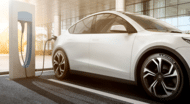
Auto Tips & Advice
Buying the right tires for an electric vehicle
One of the joys of owning an electric vehicle is how low maintenance they are compared to their gas-powered cousins. EVs have far simpler engines with less friction and less wear and tear on engine parts. However, there is one maintenance issue where EV owners have to pay close attention, namely which vehicle tires are the right choice for their electric car.
In fact, the rubber on which your EV rolls down the street is one of the most important maintenance issues in owning an electric vehicle. The special profile of an EV means it can be harder on tires, with tests showing tires wear out faster compared to an internal combustion engine (ICE) car. That’s partly due to the heavier weight of an EV but also instant torque, the iconic super-fast acceleration of an electric car that never fails to impress. Then there’s the issue of tire noise, where suddenly the sound coming from the tires can seem too loud in the relative quiet of an electric vehicle. All these EV features combined make choosing the right tires for an electric car crucial in getting the most out of your EV and ensuring a luxurious, comfortable ride.
So what do EV owners need to know about tires for electric vehicles to make the right choice when the time comes for a new set of replacement tires? And what are the factors you’ll need to consider when buying tires for your EV? Carmakers spend a lot of effort to pair an electric vehicle with just the right tire that will enhance the car’s performance, so it is important to choose tires on par with the original equipment (OE) specifications for your vehicle.
It also helps to clarify your priorities, what kind of ride you want from the vehicle tires you end up buying for your EV. No one tire can do it all, but understanding what the key considerations are when selecting tires for an electric car will help you choose tires that best meet your expectations. Ideally, the most efficient tires for your EV will offer a combination of durability and performance that can stand up to the challenges of an EV and deliver a long-lasting, quiet drive.
What makes EV tires different?
Tires designed and optimized for an electric vehicle are first and foremost able to handle an EV’s weight. Electric cars tend to be heavier than their ICE counterparts primarily because of the batteries. And that number is on the rise, especially as EV carmakers look for ways to extend the range of an electric vehicle with bigger and heavier batteries. Indeed, some electric vehicles meanwhile weigh as much as a full-size gas-powered truck, making the choice of replacement tires an important one.
EV Ready tires can handle all that extra weight without compromising performance by offering a higher load index, the maximum safe carrying capacity of a tire when it is fully inflated. Higher index load tires rely on specialized tread and rubber compounds, plus optimized tire design to withstand the heavier weight of an EV and its hungry instant torque. They grip the road for secure braking but without increasing the rolling resistance of the tire or compromising the battery’s range.
Look on the sidewall of a tire to make sure a tire offers an adequate load index for your electric vehicle as indicated in your owner’s manual. The new range of high-load tires, abbreviated “HL,” has been specially developed to do the heavy lifting required by certain electric vehicles.
EV-specific tire also needs to check a few boxes related to performance. Quiet tires that don’t overpower the relative quiet of an EV motor are an important factor to consider when choosing tires. So is low rolling resistance, with EV carmakers often working with tire manufacturers to develop EV-specific tires that will maximize a vehicle’s range. Rolling resistance, essentially the friction that occurs when the tire meets the road, translates into energy loss, which for an electric vehicle ultimately means range and how far it can go on a single charge. Michelin has long been a leader in producing energy-efficient tires with low rolling resistance, now more important than ever in the EV era, which means that Michelin tires are EV Ready.
The trade-offs involved in buying new tires: grip, wear, efficiency and noise
One thing that is important to understand when buying tires for an electric vehicle is that no one tire can do it all. Carmakers often prioritize range when optimizing original equipment (OE) tires for an electric vehicle, but with low rolling resistance and improved range comes tradeoffs, such as less grip or greater tire wear. Tire manufacturers like Michelin have made huge advances these past few years in developing EV tires that reduce the tradeoffs involved in getting the best tire for your electric car. Building on its decades of experience in designing tires for efficiency and a luxurious ride, Michelin offers a whole range of tire families that go the distance in offering EV owners tires that straddle the tradeoffs of grip, wear, range and noise.
The Michelin Primacy family of tires is an excellent choice for EV owners looking for a tire designed for ideal rolling resistance that helps extend their drive. The Primacy MXM4 tire has up to 25% lower in rolling resistance among competitors1, making it a great choice when range optimization is the priority. Plus, the Primacy MXM4 tire scores high marks as a low-noise tire, providing a significantly quieter ride than competitors2.
For EV owners concerned about tire wear, the Michelin Defender tire family leads with its terrific durability, featuring an exclusive redesigned tread design and the toughness of Michelin’s Evertread™ compound to deliver a tire engineered for longer wear. The Defender 2 tire provides 2 years of additional treadlife compared to EV competitors.3
Tire compatibility and EVs
Besides the matrix of grip, tire wear, efficiency and tire noise, there are other aspects to consider when buying tires for an electric vehicle. The ideal aerodynamics for an EV tire is less talked about but also plays a role. Narrower tires increase EV range, as can a thicker sidewall, which translates into lower rolling resistance for a longer extended drive compared to a wider wheel with thinner sidewalls.
So how can an EV owner be sure that an EV tire is compatible with their car? Double-check that you are getting the right tire size, including load index, for your vehicle that supports its heavier weight and delivers on safety and performance. And of course, the best way to make the right choice in EV tires is to understand your needs and what kind of drive you want.
Meanwhile, electric vehicles are becoming mainstream, which means you can find Michelin EV ready tires just about anywhere tires are sold. Visit the Michelin website’s EV Tires section to get started on finding the right tire for your vehicle. You can finetune your search, based on your priorities, and shop for EV tires that prioritize range, tire wear or a quiet ride.
For more facts and information about tires for electric cars, visit our FAQ page or our EV Tires page with links to in-depth articles about tires and EVs. Use the Tire Selector module here below to start shopping for the right tire for your vehicle or visit the Shop EV Tires page for an overview of Michelin’s EV-Ready tires.

Find tire dealers near you in seconds
Search by
Address, City or ZIP code
Car
-
Car
-
Motorbike
Top 5 cities in the United States
Legal Mention
1. Based on internal rolling resistance testing using the standard ISO 28580 method in tire size 235/45R18 XL comparing the Michelin Primacy MXM4 T1 tire (6.59 kg/ton) versus the Goodyear ElectricDrive GT tire (8.94 kg/ton) and Pirelli P ZERO ALL SEASON Plus ELECT tire (8.28 kg/ton). Actual on-road results may vary. Third-party trademarks owned by Goodyear and Pirelli.
2. Based on internal rolling resistance testing using the standard ISO 28580 method in tire size 235/45R18 XL comparing the Michelin Primacy MXM4 T1 tire (6.59 kg/ton) versus the Goodyear ElectricDrive GT tire (8.94 kg/ton) and Pirelli P ZERO ALL SEASON Plus ELECT tire (8.28 kg/ton). Actual on-road results may vary. Third-party trademarks owned by Goodyear and Pirelli.
3. Based on U.S. Department of Transportation Average Annual Miles per driver (13,500 miles) and Desrosiers Automotive Consultants estimate of annual average kilometers driven in Canada (23,000 km), and on a treadwear test using tires in size 235/45R18 on Tesla Model 3 Standard Range RWDs where the Michelin Defender 2 showed an estimated life (based on calculating the most-worn groove of a rotated set) of 72,301 miles versus the Goodyear ElectricDrive GT tire at 38,610 miles and the Pirelli P ZERO ALL SEASON Plus ELECT tire at 43,478 miles. Actual on-road results may vary.

